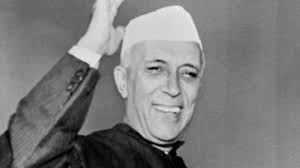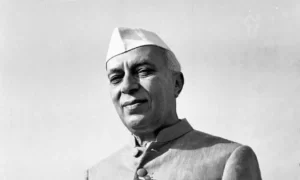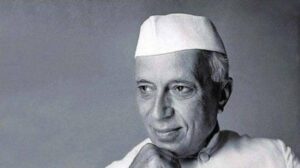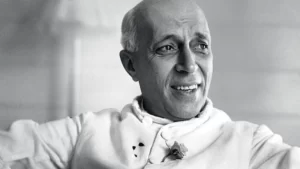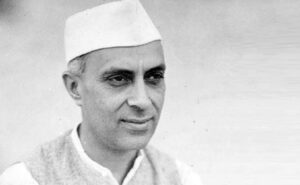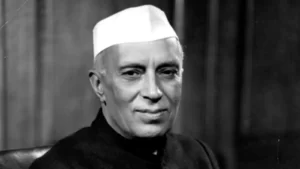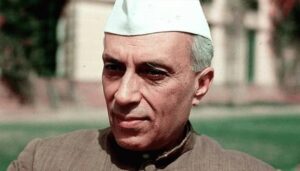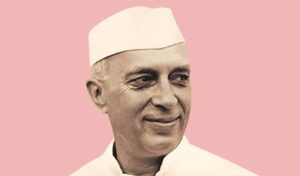Time for Work/Time for Play
There is a time for work and there is a time for play, just as there is a time for laughter and there is a time for tears. And today is the time for work in this nation.
We are a big nation. If we are a big nation in size, that will not bring bigness to us unless we are big in mind, big in heart, big in understanding and big in action also. You may lose perhaps a little here or there with your bargainers and hagglers in the market place. If you act in a big way, the response to you is very big in the world and their reaction is also big. Because good always brings good and draws good from others and a big action which shows generosity of spirit brings generosity from the other side.
Fortunately, education is spreading-not perhaps of an ideal type-but still it is some manner of education and it is doing a lot of good. It is bringing discipline, some knowledge, some habits, and if we pay more attention to the schools, it will give a strong basis for the new community that is growing up.
So, I should like you to think in terms of providing the basic necessities of life to everybody in a country like India. I am ashamed to confess that, even today in spite of every effort, there are areas of India where it is difficult to get good water to drink, and people have to go miles and miles to fetch a pot of water.
If I may put it so, I should think the very first thing to do in social welfare is to provide water to drink. There must be enough food, clothing, housing, education and health. If we could provide all these to every inhabitant, it does bring a certain basic standard of living to everybody.
Declarations are good provided they are tied up with the actual things. Let it be a definite goal that there should be no village in India where water is not available and housing does not progress rapidly.
I am not suggesting that you should all take to the spinning wheel. But, not losing myself in grand visions of a machine age, I am suggesting an approach that will directly benefit them immediately, by giving them employment. I personally enjoy such visions, but we must not lose ourselves in them. After all, we have to deal with the betterment of human beings and this aim must always be kept in view.
If you will take the trouble to learn spinning yourself you will, after a few days, feel its charm and delight in the music of the wheel.
It is obvious that one of the major problems we have to face is unemployment. It is a terrific human problem which we cannot ignore. Merely giving some kind of occupation to a large number of persons does not ultimately increase employment or lessen unemployment. We delude ourselves if we think so.
Of course, from the point of view of future growth and all that, it is essential for us to industrialize, but the very basis of industrialization is agricultural progress. Forgetting the basic fact that 90 per cent of the population need to be uplifted and looking after selected people who suffer most would give us a wrong perspective, I think.
The moment you take electricity, all kinds of things begin to move. Petty industries grow up, agriculture is affected; everything is in fact affected. The whole life of the people is changed, they will get longer hours to work because of the lighting and all that.
Just consider how much we have got to do in India whether in cities or in villages, where thousands and thousands of our people live-people who are living emblems of poverty and misery in India. It frightens me and yet it encourages me. Many of us feel that we must carry on in this way because it is the only way possible at the present moment under the present circumstances.
But I do feel and feel very strongly that in India today there are many, many things to be done. And there is one thing which is far and above others. There is one outstanding fact which we cannot ignore. It is the bounded duty of us to see that the difficulties in our way are removed the obstructions which prevent our intellectual growth, our spiritual growth, our moral growth and our economic growth.
Thus, in the final analysis, one just works. The Gita says, work we must for results, but not to care too much about the results. It really means, to work but not to be so utterly attached to the results that they upset one. In other words, to have a certain detachment even in the midst of action.
Let us get on with work, hard work. Let us produce, but what we are producing is not for individual pockets but for the nation, to raise the standard of the people and the common man. If we do that, we shall see India progressing rapidly and many of the problems that face us today will be solved.
Old Style of Doing Things
It is true that it is more difficult to deal with the ingrained customs and beliefs of the people. We pass a law against untouchability. There is no doubt that the law has a powerful effect chiefly because it had been preceded by a tremendous movement against untouchability. But the fact remains that there are plenty of people in India who still continue to function in the old way and no law can easily put an end to that. Yet modern conditions come up against it. Untouchability cannot be practised in a railway train, in a factory, or, in modern life, in a city, untouchability does not exist. In a village it does exist, although it is being uprooted.
In this way all social forces are affected by two influences. One is propaganda, persuasion and so forth; the other, the changing conditions of life. The point is not whether you should have a “surgical operation” or not, but what method you adopt for this operation. A majority in a democratic Assembly, by passing a law a very advanced law-performs an operation like that. I suppose what you mean is this: Should a determined minority perform the “surgical operation” against the inert majority?
There is too much bureaucracy in it, too many Village Level Workers filling in forms all the time, instead of doing a hard job. It is extraordinary how this disease of form-filling has grown.
Permanent officials who are not under popular control, as we know to our cost, are a danger against which we must guard. They are too wooden, and utterly out of touch with the people, and have no sense of proportion or vision. They always tend to make a close corporation of themselves, indulge in mutual praise and are wholly.
intolerant of people who differ from them. This cannot be permitted but the elected representatives can well have full control over their servants and yet allow a great deal of liberty.
I should like to say that, by and large, our officers have tried to adapt themselves to new conditions and have often succeeded in a large measure.
I have little complaint against them as a whole and should like to express my appreciation of them. But they as well as all of us are tied up in a structure of administration which is slow-moving and has too many brakes and which encourages mediocrity rather than exceptional talents.
We cannot thrust inefficient men into this office and then hold him responsible for their misconduct.
Since I have become Chairman, (Allahabad Municipality), 1 have received a vast number of applications for municipal appointments but so far as I can remember, I have not recommended even one of them to our permanent officers lest my recommendation be considered almost an order and be acted upon accordingly..
Of course, many boards and commissions are appointed and they may just produce reports.
My criticisms of the administrative system, as it is worked in India at present, were not meant to apply to individual officers or others but rather to the system. Indeed, Mr. Appleby gave high praise to the administrative apparatus of India and considered it one of the best in the world. He spoke with a large experience of many countries and with expert knowledge. That praise is worthwhile. But he also pointed out that the system that was built up in British days. efficient and adequate for the purpose as it was then, does not quite fit in with the changed circumstances of India today.
It is clear that our present P.W.D. procedure, however good it may be otherwise, leads to tremendous delay. Public criticism is very strong and I myself entirely agree with it. During war time vast numbers of buildings grew up. Here we are facing an even greater emergency and we just cannot get a move on. I have discussed this matter in the Cabinet and there is a general feeling that we must change our procedure so as to expedite building.
Some of us are waiting with some trepidation, for the Public Works Department apparently does not believe much in combining beauty with utility, for the fountain to appear in the park..
We issued some immediate directions as to what should be done to expedite the building of houses round about Delhi. How far this is being adhered to I do not know. I asked the people also to present to me a note on how new rules should be framed to expedite all work connected with relief and rehabilitation. I have not received this note yet.
I want you to look into this matter as it is of serious concern and there is a grave dissatisfaction. But apart from this matter the large question of CPWD functioning has also to be considered. It is clear that it is not functioning properly and that it has a genius for delay and obstruction.
The PW.D. has got a bad name. Whether of past inheritance or due to the manner of working of the present staff I cannot say. Whatever it may be, the present is bad and everyone from top downward must be pulled up or replaced. We simply cannot tolerate incompetence and delay in matters which require swift handling.
Every month, with unfailing regularity, complaint is made by the Mechanical Plants Department of the menial staff in the Water Works and the firemen are especially said to be inefficient. It is extraordinary how this complaint continues to be made and yet no steps are taken to remove the inefficient and put better men in their place. I hope the committee will see to this. I am told that the engineering staff is efficient but is “slack” in sending reports. They fight shy of pen and paper: I am afraid the staff will have to get over this aversion to pen and paper. Any slackness of their kind in most objectionable.
As far as possible; we want to get rid of the bureaucratic element coming from the towns and cities, petty officers ordering about everything.
If creative imagination is lacking, our growth becomes more and more stunted, which is a sign of decay.
Induction of Expertise
We have a democratic system of government now and necessarily structure of government must fit in with this. Secondly, we are faced with enormous problems of development and reconstruction and they have to be tackled with speed as well as efficiency. The old British system had no such problems to face and therefore was meant to deal with a static and more or less unchanging state of affairs. Today we are faced with a dynamic situation which requires a rapid pace of development and continuous adaptation to changing conditions. We have thus to bring our administrative structure in line with these, or we fail.
The major difficulty is trained personnel and every underdeveloped country has to face that grave difficulty…. We want trained personnel in hundreds of thousands…. Apart from the apparatus of training, institutions, etc., that have to be built up, the training. itself takes time.
We should introduce the element of responsibility and make the head of each department fully responsible for every sin of omission or commission of each clerk under him. We can only do so if we allow him considerable freedom.
I think there should be a greater inclusion of the technical and scientific type of thinking in our administration. It is good to mix the pure administrator with the technical man and the scientific man. After all, all problems today are problems of science and technology.
An able administrator or an able politician, just as an able lawyer, can grasp the broad outlines of a problem, but it is another thing to have grown up with all the processes, I think, therefore, the scientists and technicians should be associated more and more with administration and planning.
I go a little further and say that scientific and technical personnel should be introduced not only in the technical processes but in administration also.
If a well-known writer expresses views which conflict with the dominant ones in his country, he should be respected rather than subjected to any kind of restrictions.
Indeed, it is impossible for any expert to function if he is constantly interfered with, often by persons who have no special knowledge of the subject.
Under modern conditions we must have experts. If we want to utilise them to the full we must allow them a free hand and there should be as linle interference as possible with their work. The ultimate direction of everything must of course remain with the elected representatives.
Much has been said about lack of technical personnel. I do not think there is going to be any real difficulty about technical personnel. We have able persons and there is no doubt that we can train up more.
I think it is right that we should encourage honest criticism, and have as much public discussion of our problems as possible.
Employment comes through newer and more effective means of wealth production. The whole experience of the past two hundred years shows that it comes with the growth of technological methods. It is true that technological growth often leads to human misery. But precautions can be taken. Do not imagine that minus technological progress we are going to deal with the problem of unemployment. We cannot. Every country which boasts of full employment today is a country which is technologically advanced.
Let us, therefore not rule out intuition and other methods of sensing truth and reality. They are necessary even for the purposes of science. But always we must hold to our anchor of precise objective knowledge tested by reason, and even more so by experiment and practice, and always we must beware of losing ourselves in a sea of speculation unconnected with the day-to-day problems of life and the needs of men and women.


